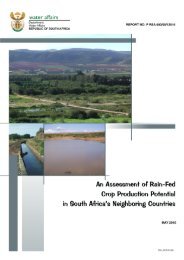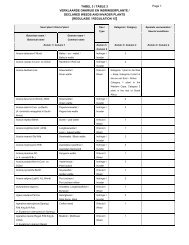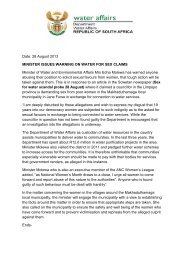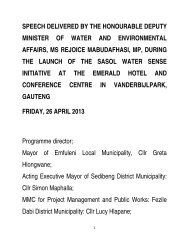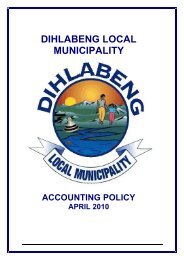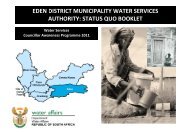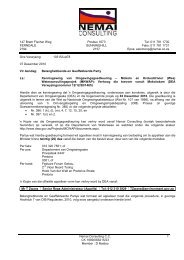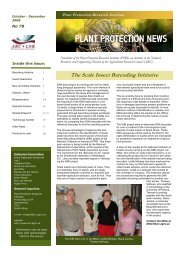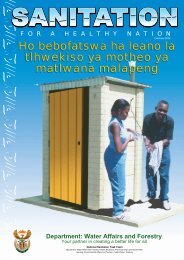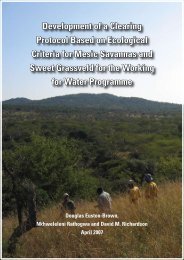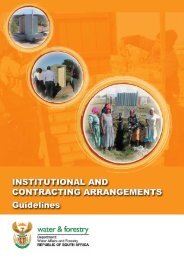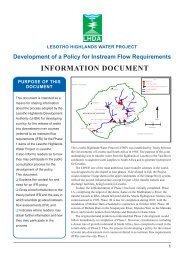Business Case forthe Pongola-Umzimkulu Catchment Management ...
Business Case forthe Pongola-Umzimkulu Catchment Management ...
Business Case forthe Pongola-Umzimkulu Catchment Management ...
Create successful ePaper yourself
Turn your PDF publications into a flip-book with our unique Google optimized e-Paper software.
<strong>Business</strong> <strong>Case</strong> for the <strong>Pongola</strong>-<strong>Umzimkulu</strong> <strong>Catchment</strong> <strong>Management</strong> Agency<br />
Access to professional, specialist skills<br />
Access to specialist skills is particularly important for the operational management of the<br />
CMA, including financial management, contract management, and specialist water resource<br />
management skills (hydrology, geohydrology, water quality, engineering, aquatic ecology,<br />
toxicology, etc). Accessing such skills will require moving outside government remuneration<br />
structures and developing the CMA as an employer of choice by creating an innovative,<br />
stimulating and conducive work environment.<br />
Public confidence in decision-making<br />
The NWA recognizes that the ultimate aim of water resources management is to achieve the<br />
beneficial use of water in the public interest. In doing this it is important to build confidence<br />
amongst users that water as a resource is a public good and must be managed in such a<br />
manner that all must benefit.<br />
Given the complexity of water management in the <strong>Pongola</strong>-<strong>Umzimkulu</strong>water management<br />
area, and the importance of this area to the economy, public confidence will be improved by<br />
demonstrating good governance through appropriate accountability and governance<br />
structures. Separation of functions will allow DWA to act as a regulator (visibly), particularly<br />
with regard to the regulation of tariffs, but also through setting of national norms and<br />
standards (e.g. for water quality).<br />
4.3 Appropriate corporate form<br />
Based on the assessment above, various corporate forms were considered. These are<br />
discussed briefly below.<br />
4.3.1 Departmental programme or dedicated business unit<br />
Based on the assessment of the rationale for the CMA, a programme within the Department<br />
or a departmental agency are not considered appropriate. A programme is limited in its<br />
ability to ring-fence risk and to manage relationships with stakeholders effectively and<br />
accountably. While a departmental agency can overcome some of these problems, it also<br />
presents challenges in terms of its legitimacy with stakeholders and other spheres of<br />
government, and a ring-fencing risk. Moreover, managing complex risk within a<br />
departmental agency is difficult, particularly as access to specialist skills in managing entity<br />
risk may be limited by departmental systems and process.<br />
4.3.2 Public entity vs. business enterprise<br />
The public entity corporate form is suitable for functions that require the involvement of<br />
stakeholders and experts to ensure effective and efficient delivery and where a moderate<br />
degree of autonomy in decision-making is desirable, or functions where it is necessary to<br />
assign decision-making to an independent juristic person in order to enhance public<br />
confidence in the implementation of a policy framework or the provision of policy advice or<br />
research. A business enterprise, on the other hand, is primarily focused on the provision of<br />
goods and services in a market environment.<br />
There are threekey reasons why creation of a public entity is preferred for the CMA:<br />
• The CMA is a service-delivery entity performing a function of government<br />
Department of Water Affairs 19



